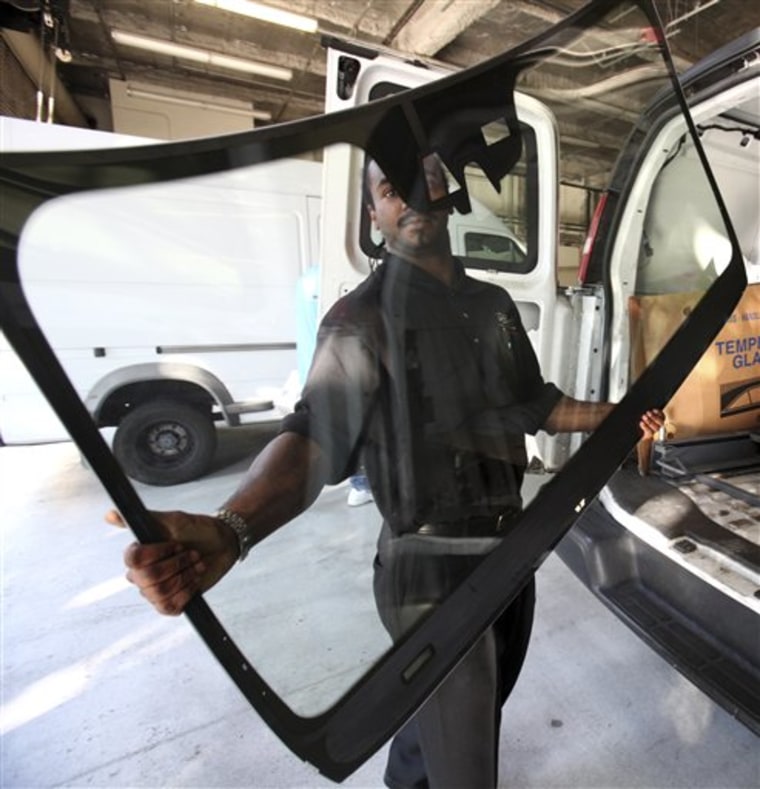California air regulators voted unanimously Thursday for a mandate requiring auto manufacturers to include sun-reflecting glass on all vehicles sold within the state by 2014.
The move by the California Air Resources Board was intended to keep cars, pickup trucks and sport utility vehicles cooler during hot weather, reducing the use of air conditioning.
That was expected to improve fuel efficiency and reduce greenhouse gas emissions.
"The end result of it is the customer gets a car that's more comfortable to ride in, air conditioners don't have to work as hard, and the atmosphere will be happier because we won't be emitting as much carbon dioxide," said board chairwoman Mary Nichols.
The auto industry complained about the expense but won an extra year to comply with the first phase of the regulation. Automakers also will be allowed to find other ways to cool down cars to avoid a tougher window standard to be phased in after 2014.
The board gave automakers more time to meet the standards after representatives for Ford Motor Co., Chrysler Group LLC, Honda Motor Co. and Toyota Motor Corp. lined up to ask the board to extend the deadline.
"We don't have a lot of spare resources right now," said Steven Douglas, senior director of environmental affairs for the Alliance of Automobile Manufacturers.
California has been a leader for decades in setting auto standards. Its mandates have often brought changes throughout the industry as automakers move to capture the state's huge market.
California was the first state to require the use of catalytic converters in 1975 as a way to reduce smog. A 2002 state law intended to force cleaner auto emissions was the reason the Obama administration implemented greater fuel-efficiency standards earlier this year.
Beginning with the 2012 model year, a quarter of passenger vehicles sold in California must have specially coated windshields that block 50 percent of the sun's heat from a parked car. All vehicles must have those windshields within two more years.
In 2016, windshields must block 60 percent of the sun's heat unless car makers can demonstrate other ways to keep cars cool.
The regulation is projected to prevent 700,000 metric tons of carbon dioxide from entering the atmosphere in 2020, the equivalent of taking 140,000 vehicles off the road for a year. There were nearly 22 million passenger vehicles registered last year in California.
The new windows would cool a sedan's interior by an estimated 14 degrees Fahrenheit or 12 degrees for a pickup or SUV.
Cell phone industry cites blocked signals
The board dismissed concerns from trade groups representing domestic and foreign car companies that sun-reflecting glass would interfere with cell phones signals, GPS navigation, electronic passes for toll roads and tire pressure monitoring systems.
The regulation allows glass manufacturers to leave a small area of the windshield free of the metallic coating to boost wireless signals. However, representatives for navigation and cell phone companies questioned whether it would be effective.
Susan Lipper, senior manager of regulatory affairs at T-Mobile USA, said drivers and passengers might be prevented from making emergency calls from their cars.
"If you need to make a 911 call and material in the windshield blocks it, that's an issue," Lipper said.
Drivers who replace windows in older cars also would have to meet the new standards.
The window mandate is among dozens of strategies pursued by the board in its effort to reduce California's greenhouse gas emissions to 1990 levels by 2020, the goal set by the state's 2006 global warming law.
'Cool paint' proposal dropped
A proposal to require so-called "cool paints" was removed from the regulation after the auto industry complained it might have to stop selling black cars in California.
The technology used by glass manufacturers to make more reflective car windows has been around for nearly 20 years, said Mukesh Rustagi, director of strategic product management at Pittsburgh Glass Works, the largest automotive glass supplier in North America.
